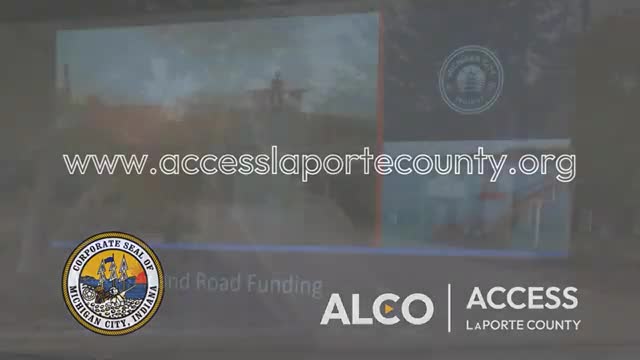Michigan City workshop warns state wheel-tax proposal could force local levy and double tax residents
Get AI-powered insights, summaries, and transcripts
Subscribe
Summary
City officials and local officials reviewed how a proposed state wheel tax tied to road grants could require Michigan City to adopt a local wheel/excise surtax to remain eligible for Community Crossings Matching Grants and warned of possible double taxation if county and city both enact the levy before a June 30 cutoff.
A city official leading a March 14 Michigan City workshop told elected officials and residents that pending state legislation would require municipalities to adopt a local wheel or excise surtax to remain eligible for Community Crossings Matching Grants (CCMG), potentially forcing Michigan City to levy a fee on vehicle registrations.
The presenter, identified in the meeting as a city official leading the workshop, said the session ‘‘is specifically about the wheel tax for Michigan City’’ and that the goal was to explain local road funding sources and how the proposed state bill could affect Michigan City. The official said the city recently received a $1.5 million CCMG award and uses a mix of funds to meet required matches.
The workshop outlined the current local revenue mix that funds streets and the street department, including the Motor Vehicle Highway (MVH) fund, local roads and streets (gasoline tax distributions), riverboat revenue, and redevelopment commission funds. The presenter described state statute rules that historically set a portion of MVH funds as restricted for construction and preservation, noting the city’s MVH split has been treated as approximately 50% restricted and 50% unrestricted for staffing and other costs.
City staff described the CCMG award the city recently received — $1.5 million — and said the local match for this award this year comes from three sources: MVH-restricted funds (listed in meeting materials as $250,000), riverboat funds ($750,000) and $600,000 from the redevelopment commission. The presenter cautioned some figures in the handout are dated and said the consulting firm Baker Tilly prepared earlier fiscal estimates of what a municipal wheel tax could generate.
Under the version of state legislation discussed at the workshop, municipalities would have to enact a local wheel/excise surtax to be eligible for CCMG funding. The official said, ‘‘This is not something that the council or the mayor is trying to push on the public. This is something that we're being forced to do,’’ and encouraged residents to contact their state representatives about the bill.
Workshop participants raised several local concerns. Trustees and township representatives told the group that township budgets could be cut under the bill and that township trustees rely on existing funding for social services; one attendee warned that reduced township funding would ‘‘put more strain on not only the trustees but also the social agencies and the not-for-profits that have been trying to help unfortunate people.’’
Officials also flagged a practical risk: if both the city and La Porte County adopt the wheel tax before a June 30, 2025 cutoff included in an amendment discussed at the meeting, residents inside Michigan City could face both a municipal and county surtax. The presenter said it was not yet clear whether later amendments carve out municipalities from double taxation and that staff would seek clarification from state legislators.
The workshop covered other issues in the bill that could affect municipal revenue: changing how the MVH restricted share is calculated using pavement-condition (Pacer) ratings (potentially lowering the restricted percentage for high-rated jurisdictions), and the creation in the bill text of a toll-road authority with broad asset-control language that raised legal and traffic concerns among attendees.
Participants also discussed local traffic and enforcement measures to protect roads paid for with new revenue: weight limits, preapproved heavy-vehicle routing similar to conditions used for major industrial moves, and stricter enforcement of an existing ordinance for 18-wheelers on Michigan Boulevard. Attendees suggested equipment purchases (for example, striping machines) and enforcing current weight/load ordinances as immediate steps if new funding becomes available.
No formal motion, vote or ordinance was recorded during the workshop. Presenters said staff will follow up with legislators, provide updated fiscal materials (including a Baker Tilly briefing), and consider additional workshops later in the legislative session to track amendments and impacts.
The city official closed by saying the city will continue to monitor the legislation, seek answers on double taxation and electric/hybrid vehicle treatment in the bill, and schedule additional briefings for council members and other elected officials as the session progresses.
